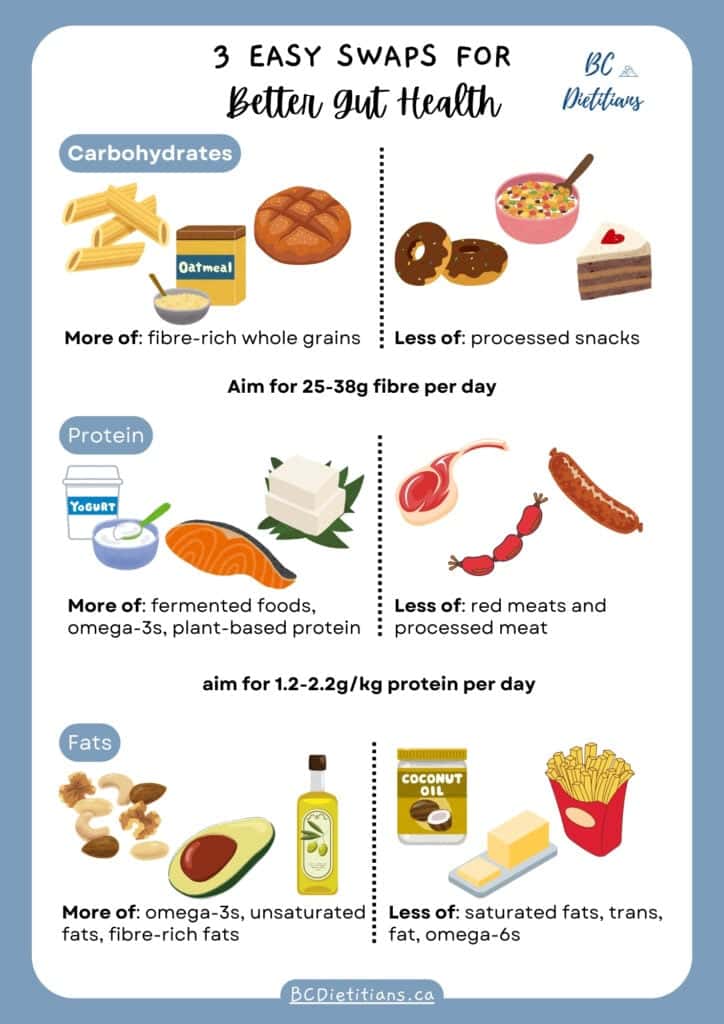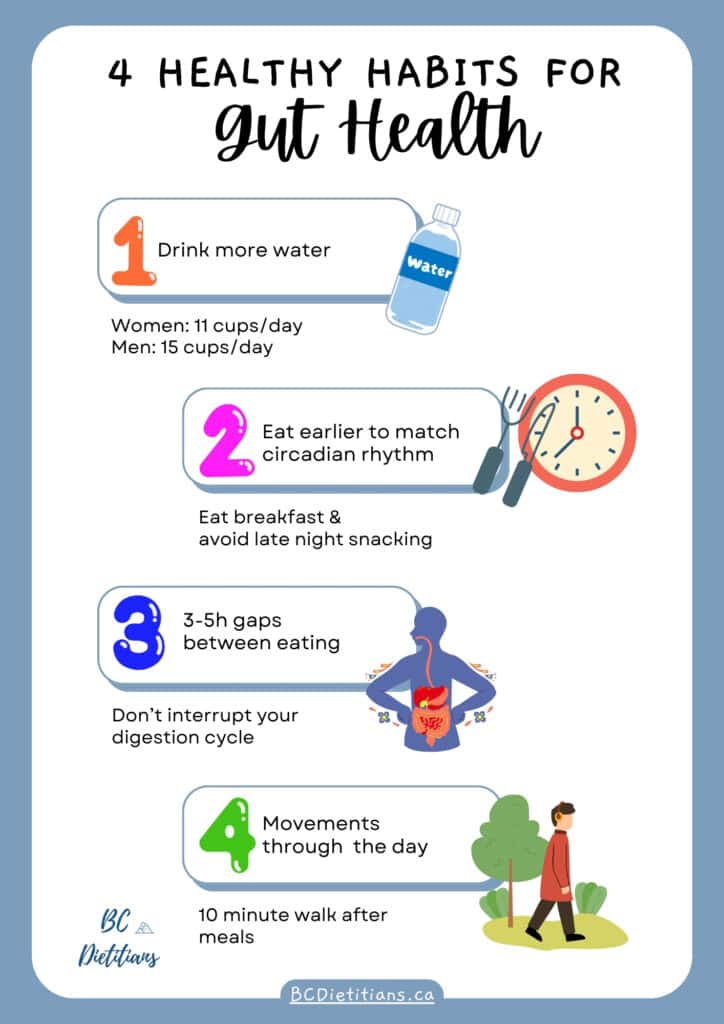Are you struggling to stay focused? Or feeling tired all day long? This could do with the state of your gut.
Millions of Canadians deal with digestive disorders daily. Canada has one of the highest rates of irritable bowel syndrome (IBS) globally. Gut health plays an important role in overall well-being, digestion, immunity and mood.
We recently had the pleasure of hosting a corporate lunch and learn session with Orbis Investments on the topic of gut health. We had some great discussions about how nutrition—especially gut health—affects everything from energy levels to mental well-being.
It’s always exciting to see teams get curious about how small, practical changes can make a big difference. We love working with companies investing in employee health and wellbeing.
If your workplace is looking for a fun, engaging way to learn about nutrition topics and cooking workshops, connect with us today.
Dietitians help your employees feel and perform their best every day.
Thank you so much again for your excellent presentation! People found it informative and very worthwhile, so thanks again 😊
Jenny E. - Orbis Investment

Gut Healthy Carbs Feeds Good Bacteria
Low-carb and ketogenic diets have been quite popular the past few decades but carbohydrates are great sources of fiber and it can be often challenging to get enough fiber with these diets.
Fiber is a type of carbohydrate, and its roles in the body include fueling beneficial gut bacteria, supporting digestion, and maintaining the gut barrier integrity. Fiber improves gut health as it feeds the good bacteria that are in your gut (gut microbiome).
Fruits, vegetables, legumes and whole grains are all great sources of fiber.
Carbs that are especially good helpful for gut health include whole grain sources that will provide lots of fiber. In addition to fiber, these foods will also provide prebiotics, which are specific fiber including inulin, fructo-oligosaccharides (fructans , FOS) and galacto-oligosaccharides (GOS).
Here are some examples that will provide 2-3g fiber per serving :
- brown rice
- whole wheat
- rye
- barley
- oats
- quinoa
Plant-Based Proteins Diversify Microbiome
It is well known that eating a protein rich diet is beneficial for overall health and building muscles but did you know that protein is also beneficial for gut microbiome diversity?
Like some carbohydrates, the proteins you consume are another good avenue to improve your gut microbiome.
Plant-based proteins including beans, lentils, chickpeas, nuts and seeds not only provide protein but they are also high in fiber and prebiotics.
Not sure how to cook these foods? Try adding in the plant-based proteins with your regular meat dishes to get familiar with these gut-nourishing ingredients.
Research has found that consuming probiotic-rich protein foods is a simple way to increase the balance of good bacteria in your gut.
Regular intake of probiotics is associated with stronger immune systems, improved nutrient absorption, and better mood. Examples of probiotic-rich protein foods include yogurt, kefir, cottage cheese, and tempeh.
Healthy Fats Decrease Gut Inflammation
Fat is another key part of our diets that can aid with gut health. Healthy fats such as omega-3 fatty acids and polyunsaturated fats (PUFAs) have been shown to decrease concentrations of bad bacteria associated with inflammatory bowel disease.
Moreover, omega-3 fatty acids reduce gut inflammation, support a healthy gut lining, and promote microbiome diversity.
Good sources of omega-3 fats include :
- salmon, trout,
- flax seeds,
- chia seeds
- canola oil,
- soybeans,
- fatty fish,
- nuts, and seeds
Limit consuming excess omega-6 fats, trans fats and saturated fats as they can have an inflammatory effect on the gut. Processed foods, deep fried foods and red meats are high in these types of fat.

Restore Your Gut Health with a Holistic Approach
Consuming a balanced diet with adequate amounts of fiber, prebiotics, probiotics are key to a healthy gut.
However, we really need to work on a holistic approach to gut health. This includes looking at other lifestyle habits that may be beneficial for gut health.
Hydration should also be a priority as it helps with digestion and nutrient absorption. Drinking enough water and fluid prevents constipation, bloating and gas, and maintains the mucus lining of our digestive system.
It is recommended to drink at least 11-15 cups (2.7-3.7L) of fluids everyday. Fluids such as soup, tea, and coffee also contribute to fluid intake but be mindful of your caffeine intake and how it impacts your gut health.
Maintaining a consistent eating schedule also supports gut health because it helps maintain your circadian rhythm. Some practical tips includes :
(1) starting your day with a balanced breakfast,
(2) aim for a 3-5 hour gap between eating,
(3) avoiding late-night snacking before bed.
Staying active and regular exercise has huge benefits on digestion and gut health as well. In addition to helping you maintain a healthy weight, exercise reduces inflammation, increases microbiota diversity, and reduces your risk of bowel diseases and colon cancer.
In fact, a post-meal walk as short as 2-5 minutes has been shown to aid digestion, stimulate metabolism, and improve your blood sugar control. Slowly incorporate exercise into your daily routine to improve not only your gut health, but your overall health and well-being.
Gut health supplements
Although whole foods are the best sources of the nutrients outlined, sometimes supplementation can also be helpful in promoting gut health.
Prebiotic supplements such as inulin, barley fiber or psyllium husk can be beneficial if you struggle to get enough fiber from food sources.
These supplements help with bowel regularity, digestion, blood sugar control, and appetite regulation. Start with small doses of fiber or prebiotic supplements and slowly build up tolerance.

Conclusion
Start improving your gut health by making small and realistic changes. The simple formula to a gut healthy meal includes:
(1) fibre-rich carbohydrates,
(2) protein,
(3) healthy fats, and
(4) prebiotic-rich and fermented foods
Additionally, proper hydration, a consistent eating schedule, regular exercise, and considering supplements can further enhance your gut health. By making small changes for gut health everyday, you can work towards a healthier, happier you!
Blog Contributors:
Amy Chow, Registered Dietitian
Kelly Chia, Dietetics Student






Add a comment